Let’s Talk About It: Breast Cancer (Survivor’s Guilt)

The question of “Why me?” often exemplifies the experience of survivor’s guilt. Feeling survivor’s guilt is more common than you may think and can be triggered in different ways. Your positive news at a follow-up visit, regaining strength when treatment ends and manageable side effects are all events that may counter-intuitively lead to stress or […]
Part II – Body Grief: Losing parts of ourselves and our identity before, during and after cancer treatment
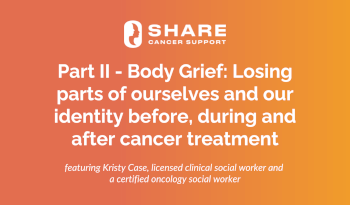
When cancer is diagnosed, there is a common experience for people to feel under attack or betrayed by their own body. Some even experience distrust and dissociation with their body. The multitude of losses that come along with a cancer diagnosis are sometimes met with well-intended but insensitive feedback from those around you. Grieving for […]
Let’s Talk About It: Breast Cancer (What is Mindset and Does it Really Matter?)

Your mindset is the way you make sense of the world around you. This lens influences the way you think, the way you feel, and how you might behave in certain situations. Let’s talk about mindset myths that can get us into trouble and ways to cultivate a mindset to support your cancer survivorship in […]
Part I – Anticipatory Grief: Experiencing grief before the loss has happened
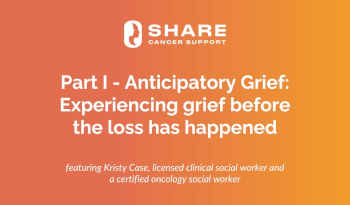
Anticipatory grief is the emotional experience when there is an impending loss that will occur. Often, people associate loss and grief with death, this is just one area in which grief and loss can occur. Anticipatory grief is often a slower grieving process marked by intermittent, small or large losses. In the world of cancer, […]
Let’s Talk About It: Breast Cancer (Communication, Intimacy, and Sex… Oh My!)

Changes to your body are normal to experience related to a cancer diagnosis. But the grief and the learning to live with a changed body take time. But what if you share your body with someone else? What if finding pleasure and connection through intimacy feels like an overwhelming or insurmountable obstacle on your road […]
Embracing Life’s Balancing Act

Do you want to feel empowered and confident in preserving your independence and lowering your risk for injury? Falling is a common issue for adults over 60 and those with chemotherapy-induced peripheral neuropathy (CIPN), however, research shows there are effective strategies we can put in place to reduce our chance of falling, and of injury […]
Why Black Data Matters in Clinical Trial Research
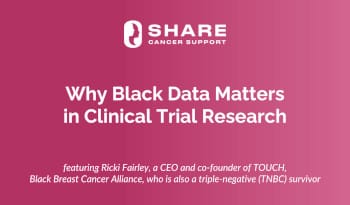
We are excited to be joined by Ricki Fairley, a CEO and co-founder of TOUCH, Black Breast Cancer Alliance, who is also a triple-negative (TNBC) survivor. Ricki discusses the importance of the Black Data Matters (BDM) initiative established in June 2020. The main aim of this initiative is to bring attention to and focus on […]
Tips for Managing Chemobrain
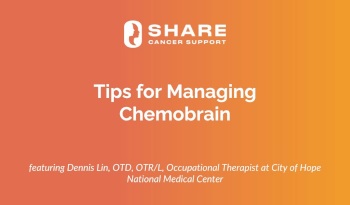
Chemobrain, or mental fogginess, is experienced by many patients during and after cancer treatment. But what are some strategies that help? In this webinar, Dennis Lin, OTD, OTR/L, Occupational Therapist at City of Hope National Medical Center, will provide tips on how you can manage chemobrain and support better engagement in your daily life. Key […]
Let’s Talk About It: Breast Cancer (To Disclose or Not to Disclose?)
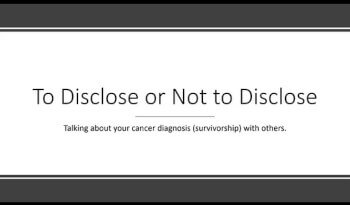
Sharing your cancer diagnosis with others can bring up a range of unexpected feelings and questions. Deciding who you tell, how much to share, and why are all important things to consider. The answer to these questions is personal and it varies not only between survivors but also in different settings and relationships in your […]
